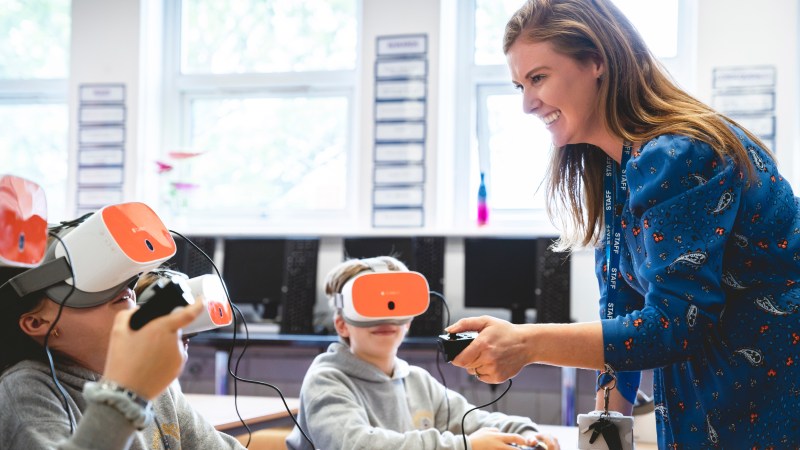Demand for VR in US schools spurs growth for Avantis
Wearing Avantis’s virtual-reality headsets during lessons, pupils can go back in time to a First World War trench or travel into deepest space. Yet overseeing the Gloucester-based company’s biggest and fastest-growing market in the US still requires real-world sales teams visiting schools and talking to teachers across states.
Two elements are essential for a British education technology company to succeed in the US, according to Huw Williams, the chief executive. The first is that “it has to feel like an American product and the marketing has to look American”. For example, the company ensures that its VR lessons fit the differing requirements of the curriculum in each state.
The second element is “learning the routes to market and working with people that have the relationships”, because there are more than 100,000 schools in the US.
The company has been making different types of hardware and software for learning since 2007 and built up contacts over that time through trade fairs such as Bett, the global education technology exhibition held at Excel in London.
Avantis’s initial sales route was through third-party resellers who worked with different school districts. But since opening a US office in Chicago in 2022, the company has been building its own field sales team as well as working with resellers, said Williams. The private equity firm LDC invested an undisclosed sum in the same year, which Avantis has used to fund the cost of incorporating in the US and hiring staff.
Williams himself makes the 8,000-mile round trip to Chicago every six weeks to work with the team of about 30 people Avantis now has in the country.
LDC replaced Key Capital Partners, another private equity firm that had invested £4.25 million in Avantis in 2020. Before that, the company had been self-funded. Williams, who has worked for Avantis since 2013, took over from its founder Nic Tuson as chief executive last year, with Tuson remaining on the board as a non-executive director.

The company expects sales to increase by 50 per cent this year, from £23 million in 2023, with US revenue growing fastest. Avantis sells to 90 countries, and only 10 per cent of revenue comes from the UK. European countries including Spain and Italy have made specific investments in technology for schools, which has spurred sales in those markets. However, in Britain money hasn’t been ring-fenced in such a way for tech products in primary and secondary schools for the past five to ten years, said Williams.
The company began selling its Class VR headsets in 2017, inspired to develop them by a Google programme in 2016 to give one million children in British schools the chance to try out VR. A growing number of classroom teachers and headteachers were also saying that it was getting harder to engage students with traditional teaching methods, Williams said.
“We wanted to offer them a cool bit of tech and we knew that with VR there is a visceral response when they first put the headset on — both for children and teachers,” he said. “You can think about it as going somewhere you cannot go in real life — for example, looking around inside the human body. And teachers come up with all sorts of creative uses.”
Avantis makes its headsets in Asia and develops the software and educational content at its Gloucester headquarters. The headsets are controlled centrally in the classroom by the teacher, who can see what each child is watching and doing during the lesson.
Schools buy the headsets and pay a subscription fee to use Avantis’s content and the classroom management tool. Avantis also helps schools to set up the equipment and maintains it. This way of working allows it to compete with tech giants like Google, said Williams.
“School staff are time-poor. They don’t want to go to one company for the software, one for the hardware, another for the support,” he said.
The company employs teachers in its sales and content development teams, because “teachers love to advocate to other teachers if they really see a benefit”, said Williams.
Avantis is now looking at how artificial intelligence (AI) can be used with its products, with a focus on streamlining teachers’ tasks to save time rather than replacing contact between teachers and students. The company is also using AI to create content, said Williams, including using voice prompts to generate images.
The scramble to homeschool children during the pandemic has had two lasting benefits for Avantis, he said. The first was that “the education sector realised that it had been left behind when it came to technology and once schools went back into session we had a lot of pent-up demand”. Changes to working patterns have also made it easier to run a company on both sides of the Atlantic because people are used to working with each other remotely, he said.






